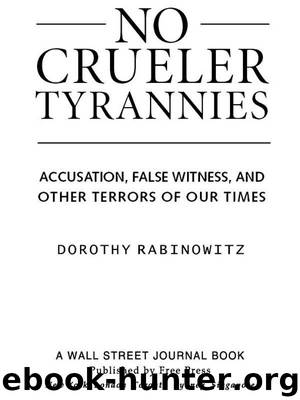No Crueler Tyrannies: Accusation, False Witness, and Other Terrors of Our Times (Wall Street Journal Book) by Rabinowitz Dorothy

Author:Rabinowitz, Dorothy [Rabinowitz, Dorothy]
Language: eng
Format: azw3
Publisher: Free Press
Published: 2003-03-27T05:00:00+00:00
In time, the appeals courts overturned one conviction after another. In 1997, the young New York appellate attorney Robert Rosenthal, by now one of the leading experts in these cases, won a reversal of Carol Doggett’s conviction. Attorney Eric Nielsen won a reversal of Mark Doggett’s conviction.
The Washington State papers, which had paid little or no attention to the Wenatchee cases at the height of the investigations and roundups, in time began to turn out comprehensive investigative pieces on the story. There were calls for state investigations. In 1998, a state appeals court appointed Whitman County Superior Court judge Wallis Friel to hold hearings into the conduct of the investigations and the evidence against one couple, which became a commentary on all the cases. Harold and Idella Everett were central figures in this story, not least because they were the parents of the girls who had made all the accusations. In his findings, a lethal description of the behavior of Child Protective Services therapists, counselors, and state witnesses, the judge enumerated in elaborate detail the accusations of the state’s two star witnesses, Donna and her sister, Melinda, and concluded that “no rational trier of fact would believe these allegations.”
Ralph Gausvik, who had wept throughout his trial, been sentenced to twenty years, and refused all offers of a guilty plea, won release when Rosenthal filed a petition in his behalf.
After his exoneration, Pastor Robert Roberson embarked on an unyielding legal battle on behalf of those still imprisoned. With his copious records, his unequaled grasp of the details and overall history of this affair, Roberson proved an indispensable guide for attorneys working on the criminal and civil cases.
Caseworker Paul Glassen, who had fled Wenatchee with his wife and child, ultimately found a job, notwithstanding the computer listing him as a suspected abuser. Late in the summer of 1996, when he had gone jobless for a year, he approached the adminstrator of the Canadian social agency who had just hired him and with trepidation informed her of what she would be finding in the criminal background check. That check would mention a felony, the charge of police obstruction, and the fact that he was suspected of molesting fifty children. She listened to this recital without interruption, and when it was over, she had but one question for Glassen: Did this mean he would now be able to start full time?
Glassen remains employed at the agency, grateful, still, for the memory of that moment. He received a settlement of a few hundred thousand dollars from the city of Wenatchee and a letter declaring that he was not involved in or suspected of crimes of child sex abuse.
Former businessman and foster father Robert Devereaux, who took the minor plea and sold his house to pay his lawyer, lived an impoverished man thereafter. He was invited to live in a small apartment belonging to one of his grateful foster daughters, now married, and found employment at a service station, where he still works.
Cited in numerous civil suits still pending against the city of Wenatchee, Detective Robert Perez retired on disability.
Download
This site does not store any files on its server. We only index and link to content provided by other sites. Please contact the content providers to delete copyright contents if any and email us, we'll remove relevant links or contents immediately.
The Borden Murders by Sarah Miller(4325)
The Secret Barrister by The Secret Barrister(3710)
Police Exams Prep 2018-2019 by Kaplan Test Prep(2549)
Coroner's Journal by Louis Cataldie(2479)
The Splendid and the Vile by Erik Larson(2474)
Terrorist Cop by Mordecai Dzikansky & ROBERT SLATER(2080)
A Colony in a Nation by Chris Hayes(1935)
My Dark Places by James Ellroy(1931)
The Art of Flight by unknow(1878)
Black Klansman by Ron Stallworth(1796)
Objection! by Nancy Grace(1786)
A Life of Crime by Harry Ognall(1731)
The New Jim Crow by Michelle Alexander(1702)
Anatomy of Injustice by Raymond Bonner(1670)
American Prison by Shane Bauer(1660)
Invisible Women by Caroline Criado Perez;(1642)
Whoever Fights Monsters by Robert K. Ressler(1618)
Obsession (The Volkov Mafia Series Book 1) by S.E Foster(1580)
A is for Arsenic: The Poisons of Agatha Christie (Bloomsbury Sigma) by Kathryn Harkup(1549)
